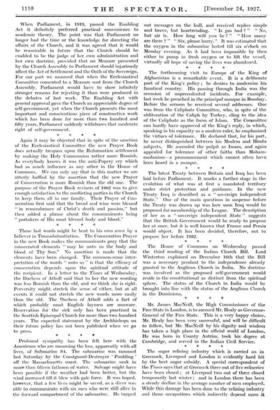When Parliament, in 1919, passed the Enabling Act it definitely
preferred practical convenience to academic theory. The point was that Parliament no longer had the time or the knowledge for directing the affairs of the Church, and it was agreed that it would be reasonable in future that the Church should be enabled to be the judge of her own administration and her own doctrine, provided that no Measure presented by the Church Assembly to Parliament should injuriously affect the Act of Settlement and the Oath of the Sovereign. For our part we assumed that when the Ecclesiastical Committee consented to a Measure sent from the Church Assembly, Parliament would have to show infinitely stronger reasons for rejecting it than were produced in the debates of last week. The Enabling Act with general approval gave the Church an appreciable degree of self-government, yet when the Church presents the most important and conscientious piece of constructive work which has been done for more than two hundred and fifty years, Parliament suddenly withdraws that moderate right of self-government.






























 Previous page
Previous page